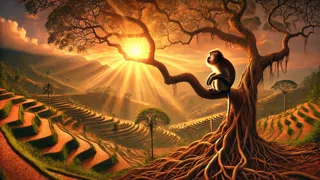Introduction
Long before kingdoms rose across the Indonesian archipelago, there lay a valley so fertile that its emerald terraces dazzled under a heavenly sun. For generations, farmers bowed beneath that same sun each dawn, praying for rains that blessed their rice paddies. But one season, the blazing star refused mercy. From the eastern horizon to the western ridge, its fire beat down without pause. The riverbeds cracked, the palms drooped, and the people drifted toward despair. Under that merciless glare, even the sturdiest bamboo huts warped and groaned like weary giants. Amid this great trial, a spirited monkey watched from the fissured rocks. He was nimble of limb and keen of eye, with a heart both playful and wise. Each morning he darted from tree to branch, scanning the sun’s journey as though searching for a crack in its brilliance. He saw the town’s children huddle in shadows, saw the tremors of fear in the elders’ voices as they spoke of empty granaries. In that moment, something stirred within the monkey’s clever mind: what if he could outwit the very orb that robbed life from the valley? What if he could coax the sun into shade and breathe relief into parched fields? Born of compassion and mischief, his plan would test cunning against cosmic power, craft against scorching flame. It would demand three daring trials—each more treacherous than the last. And when at last the sun yielded, the valley would learn that sometimes it takes a trickster’s heart to shield the world from ruin.
The Scorching Sun and the Withering Fields
Beneath the relentless blaze, the valley’s earth cracked into a tapestry of fractures. Farmers trudged through dust like ghosts of their former selves, their wide-brimmed hats offering but a sliver of relief. Palms drooped, their fronds crisped to brittle lace, while clumps of rice stalked the great terraces like abandoned battalions. Each dawn, the sun rose without mercy, scorching the dew that once clung to emerald shoots. By noon the parched riverbeds lay exposed as gaunt highways, their silence broken only by the rasp of wind slipping through crevices.

Between two ridges, the earthen huts of the hamlet huddled near a dying well. There, the villagers gathered each afternoon to sacrifice the last drops of hope into rusted pails. Mothers coaxed water from graying ceramics, passing cups to children whose hollow faces betrayed their thirst. The elders drifted into silence, the ritual prayers falling from their lips like brittle ash. Even the ancient banyan at the village’s heart, once a sanctuary of cool shade, surrendered to the sun’s tyranny, its roots shrinking and bark cracking.
Far above it all, the monkey leapt from branch to branch in a desperate search for possibility. His keen gaze traced the sun’s path across the heavens, marking every cloud that dared drift near. He observed how a single wisp of vapor cast a fleeting shadow across the valley floor. He watched as lightning storms far off rolled in heavy masses, only to disperse before arriving. And he wondered: what if the sun could be convinced to share the sky? What if, through bold trickery, he could grant the valley the one gift it craved most—shade?
The Three Trials of the Monkey
The monkey issued his challenge in the break of dawn, his voice woven with newfound purpose. First, he would test the sun’s vanity. He scampered to the rocky outcrop above the hamlet and called: “O mighty Sun! Why do you burn without pause? I wager your light cannot be contained by mortal means.” Thinking this a jest, the sun blazed fiercer still, its golden rays leaping toward the earth in an attempt to show unbridled strength. The monkey ducked and bobbed around ancient stones, brandishing a leaf like a shield. “Prove you own the sky, then follow me,” he chittered, leading the sun’s glance to a deep cave mouth. Curious and proud, the sun narrowed its glare to peer inside—and in that moment, the monkey hurled a great boulder to seal the entrance. Dust swirled as the chamber’s heat built up, and with a roar of surprise and anger, the sun first felt the sting of confinement. Freed at last by a hidden passage, it soared back into the open, simmering with newfound respect for cunning over force.

Next, the monkey sought to humble the sun’s pride in warmth. He beckoned the orb toward the river bend at midday, where a mirror pond lay still. “See yourself here,” he teased. “Reflect your true nature.” Intrigued, the sun angled its light across the water, igniting a brilliant shimmer like liquid fire. As the light danced, the monkey plucked giant lotus leaves and wove them into a lattice. When the mirror shimmered brightest, he hoisted the lattice into the pond, scattering ripples that fractured the reflection. The sun’s gleam splintered into thousand shards of light, each hopping across every drop. Confounded, the sun found its power diffused, its aura humbled by the smallest ripple. It blinked beyond the pond and found the skies dimmer, its vanity deflated by the lesson that unity could overcome singular might.
Finally, the monkey demanded the sun’s promise to temper its blaze. He led it to the mountainside grove where an ancient flame tree grew—its blood-red sap known to glow even at dawn. “If you vow to spare these lands, witness the purity of this flame,” he said. The tree’s sap flickered in a graceful dance, longing for balance between heat and calm. The sun gazed upon that flame and sensed kinship: both were born to provide light, yet both could scorch when unchecked. In that quiet communion, the sun bowed its brightness and agreed to temper its relentless path. With a mighty sigh, it edged behind a soft veil of clouds, allowing only a gentle glow to warm the earth.
The Sky’s Secret and the People’s Gratitude
In the hush that followed the final trial, the valley quivered under a sky now gentle and forgiving. Soft clouds drifted like cotton banners across a tapestry of gold and green. The first cool breeze in months whispered across terraces, coaxing jade leaves to shiver and sigh. Where once the fields had resembled parched bone, they now gleamed with promise. Rice shoots, encouraged by the tempered sun, reached upward in slender columns, brimming with dew that sparkled like gems.

Villagers emerged from their enclosures as if from a long dream. Farmers knelt in the furrows, pressing cool earth between their fingers. Children splashed in the slow-moving stream, their laughter a jubilant chorus that seemed to awaken the very rocks. Elders circled the ancient banyan, whispering gratitude to the trickster who had bridged mortal need and cosmic power. They offered simple gifts—woven grasses, bowls of fragrant rice, baskets of turmeric—to the monkey who sat quietly on his perch, his eyes bright with satisfaction.
News of the monkey’s deed traveled beyond the valley. Traders arriving on foot or by river stopped in wonder at the fields that thrived under a sky neither harsh nor hidden. Caravans brought spices, silks, and metal tools as tokens of respect—and songs were composed praising the day when a humble monkey taught the sun the wisdom of mercy. In every corner of Java, storytellers wove his legend into campfire tales. They reminded each generation that even the mightiest can learn from the smallest, and that harmony between power and compassion can renew the world.
And so the monkey’s name endured: Hider of the Sun, Shadow Weaver, Light Tamer. He became a symbol that ingenuity paired with empathy can reshape destiny. Yet each storyteller knew the true magic lay in a simple act of kindness—a reminder that sometimes the boldest hero is the one who unveils the sun’s own shadow.
Conclusion
As the years passed, the valley regained its splendour. Ancient trees took root and towers of green rice climbed each terrace, a living testament to second chances. Scholars who visited spoke of the clever monkey’s legacy in hushed tones, marveling that a creature born to frolic possessed such profound insight. Mothers would tell their children of the sun’s first great lesson in humility, and how a single spark of courage had rekindled hope for an entire land. Festivals arose around the day the sky dimmed, with lantern parades and offerings by the riverbank—a celebration of unity between humanity, animal, and star. Yet through all the pomp, folk songs always returned to a single refrain: “Blessed be the heart that shields the world from ruin.” That sentiment, born beneath the tempered sky, would echo forever across Java’s archipelago. In every generation, the story of the Hider of the Sun reminds us that kindness can outshine the fiercest blaze and that, if we dare to see beyond our fears, even the most scorching challenge can be softened by a bold and compassionate spirit.

















